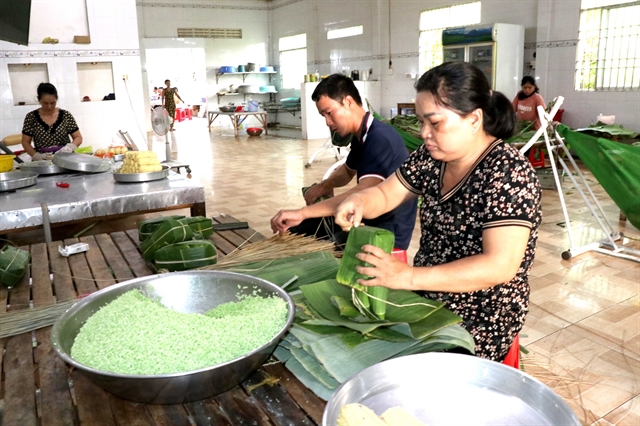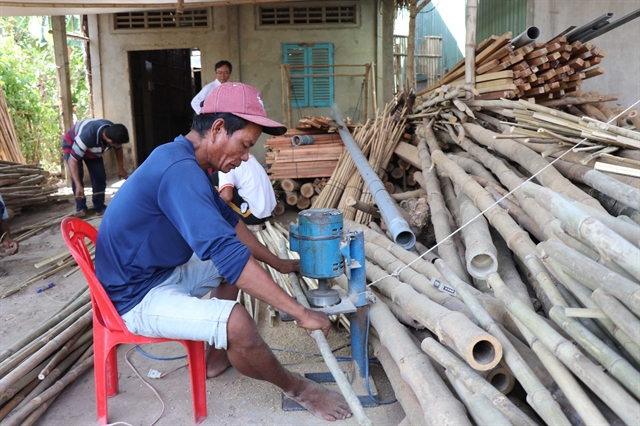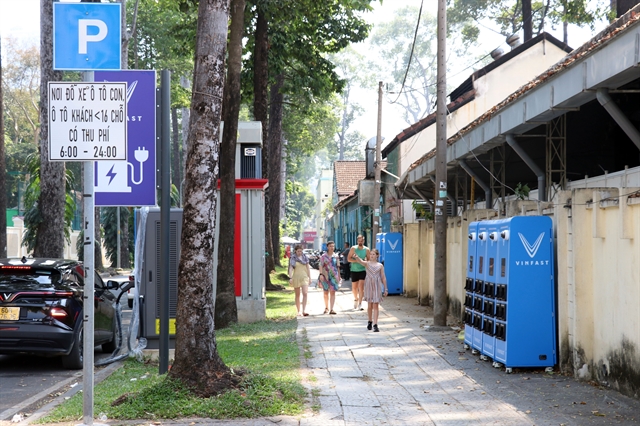 Society
Society


|
| The Nguyễn Thị Thu Quyền Tét Cake Making Establishment in Đa Lộc Commune in Trà Vinh Province’s Châu Thành District provides regular employment for seven workers, each earning a monthly salary of VNĐ6-7 million (US$230-270). — VNA/VNS Photo Thanh Hoà |
TRÀ VINH — Trà Vinh Province is stepping up vocational training for rural labourers to improve the quality of the workforce, promote agricultural restructuring, and build sustainable new rural areas.
The Cửu Long (Mekong) Delta province plans to organise between 200–245 agricultural vocational training courses for 6,900 labourers this year, focusing on basic-level training and courses lasting less than three months.
It gives training priority to ethnic minorities, people with disabilities, poor and near-poor households, those who have had their land reclaimed, rural women, and other groups.
The province will also organise two to three capacity-building courses for co-operative management staff this year. This includes training co-operative directors with the aim that 80 per cent of directors receive basic-level training.
The province emphasises training in sectors that support production, key products, products under the country’s “One Commune–One Product” (OCOP) programme, rural tourism, high-tech agriculture, circular economy, and development of new-style rural areas.
Training topics include production standards, new technologies, traceability, processing, preservation, mechanisation, and the development of agricultural product supply chains.
The province is leveraging resources from three national target programmes for the 2021-25 period, as well as other ongoing programmes and projects, to focus on vocational training for rural workers.
Trần Văn Vũ, Vice Chairman of the Trà Vinh Province Union of Science and Technology Associations, said training a high-quality workforce is a key factor in driving breakthroughs in agricultural sector restructuring linked to development of new-style rural areas.
This meets the demands of both domestic and international labour markets and serves as a pioneering step toward building a high-tech agricultural sector that applies the achievements of the Fourth Industrial Revolution, offers high added value, and promotes sustainable development, he said.
The province organised 451 agricultural vocational training courses for 16,155 rural labourers from 2022 to 2024.
After participating in these courses, the workforce has made significant contributions to implementing models and projects that enhance agricultural production, create jobs for rural workers, and build new-style rural areas, according to the province's Department of Agriculture and Environment.
Agriculture remains the province’s key economic sector, with a total production value in 2024 reaching VNĐ32.4 trillion (US$1.2 billion), an increase of 4.26 per cent compared to 2023.
The province has nearly 32,000ha of high-tech agricultural land that uses semi-automatic irrigation, net houses, hydroponics, VietGAP, GlobalGAP, organic standards, or intensive aquaculture.
However, the supply of high-quality human resources in agriculture remains insufficient to meet the demand of modern science and technology.
Huỳnh Ngọc Xuân, Director of the Centre for Industrial Promotion and Trade under the province Department of Industry and Trade, said the province has more than 16,000 rural business establishments, employing around 37,000 workers.
The province has focused on diversifying support activities for rural industrial products to increase added value, promote industry and handicrafts in rural areas, ensure sustainable development, and create jobs for rural workers, he said.

|
| Workers at the Trì Cảnh Establishment in Hàm Giang Commune in Trà Vinh Province’s Trà Cú District specialise in making household items made from bamboo. – VNA/VNS Photo Thanh Hoà |
Assisting the poor
The province has promoted vocational training and job placement services for poor households, especially in rural and ethnic minority areas.
The campaign “For the Poor – Leaving No One Behind” in the province has focused on vocational training and job creation, empowering poor households to improve their skills, increase their income, and achieve sustainable livelihoods.
It has also helped numerous households escape poverty.
Local authorities and socio-political organisations have implemented many effective models under the campaign.
The province’s Farmers Association has supported a total of VNĐ10 billion ($384,000) for nearly 2,000 needy households, and established many successful production models such as blood cockle co-operatives, goat breeding co-operative groups, and models of breeding cows for producing calves.
Nguyễn Thanh Phong in Cầu Kè District’s Châu Điền Commune is a shining example of overcoming hardship through determination, effort, and the support of capital and farming techniques from the province’s Farmers Association.
His family was granted VNĐ25 million ($960) from the association to breed cattle. He said he grows grass and harvests rice straw on his land to feed the animals, reducing costs.
Besides livestock, Phong also grows oranges and rice to diversify income, stabilise his family’s livelihood, and save enough to build a more spacious house.
The province’s poverty rate fell from 3.56 per cent in 2021 to 0.87 per cent last year. — VNS




